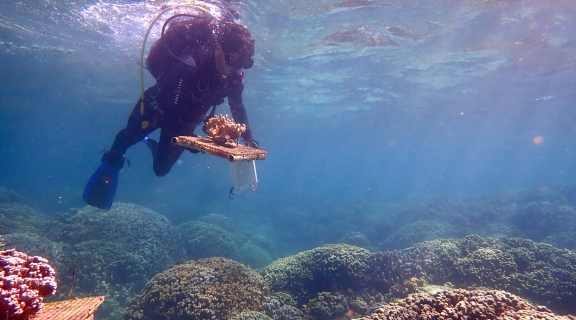
Rosenberg Institute Seminar Series - Shayle Matsuda
Overview
The role of microbial symbioses in reef coral conservation under climate change
Shayle Matsuda, David H. Smith Conservation Research Postdoctoral Fellow, John G. Shedd Aquarium
All multicellular life hosts diverse microbial communities that are integral to biological function; these microorganisms drive metabolism, stress resistance, and acclimatization at organismal and ecosystem scales. For modern reef-building corals, their success hinges upon interactions with associated photosynthetic endosymbiotic algae. However, increasing sea surface temperatures cause a breakdown in the coral-algal symbiosis, a process known as coral bleaching, which is one of the greatest threats of anthropogenic climate change to the future persistence of coral reefs. I will discuss how different algal symbiont species drive resistance to bleaching in corals, and how dynamic and flexible symbioses affect resilience at different scales (reef, colony, polyps) and life stages. Also, how the capacity for coral larvae to form persistent symbioses with different algal symbiont species may inform active, scalable intervention strategies to boost coral reef survival, including the effect of elevated temperatures.
Shayle Matsuda, Ph.D., is coral microbial ecologist and a David H. Smith Conservation Research Postdoctoral Fellow in Shedd Aquarium’s Daniel P. Haerther Center for Conservation and Research. His research focuses on the effects of climate change on reef-building corals and developing scalable solutions to increase resilience. Matsuda completed his PhD at the University of Hawaiʻi Mānoa and the Hawaiʻi Institute of Marine Biology, his MSc at San Francisco State University and the California Academy of Sciences, and his BA at the University of California Santa Cruz. He is an avid science communicator and advocate for DEIJ in STEM.